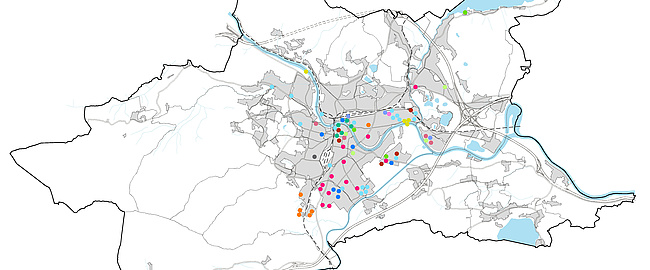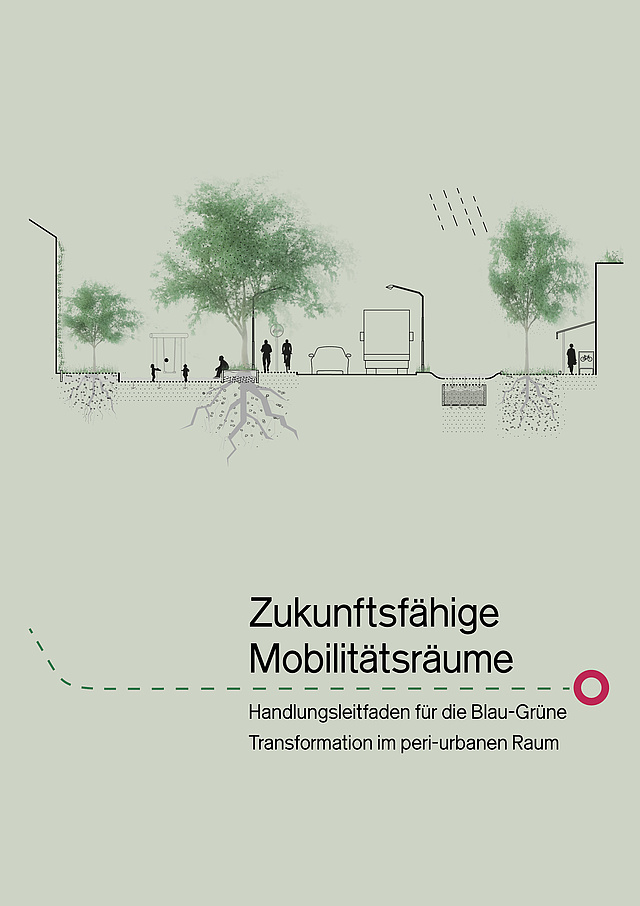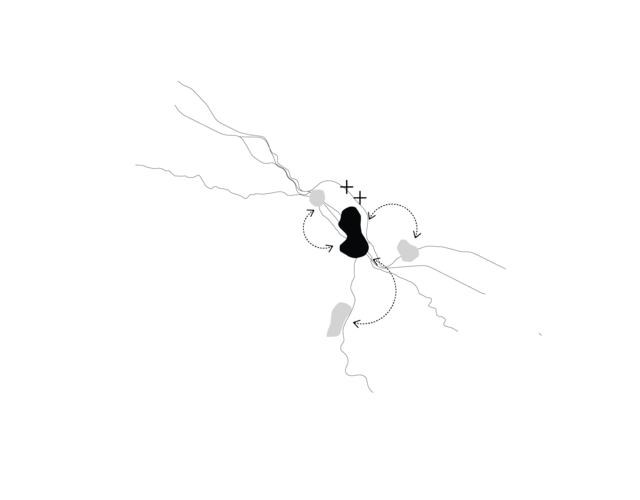TERRITORY/PLANNING
For the sustainable development of cities and municipalities it is important to understand them as part of a larger area. Mobility, public spaces, and settlement structures should be considered in a regional context. Urban designing needs to recognize the potentials and challenges that result from spatial formations. In this research area, the Institute of Urbanism is concerned with strategies for sustainable development which include, strengthen, and use interrelationships between the region and individual municipalities.
Sustainable Mobility Spaces – A Guideline for the Blue-Green Transformation in Peri-Urban Areas
Climate change, urbanization and the ensuing competition for land pose major challenges for our settlement areas. Peri-urban areas in particular have the potential to create sustainable and climate-resilient structures through an integrative redesign of mobility spaces.
This practical manual offers well-founded planning approaches and concrete tools for transforming traffic areas into multifunctional blue-green infrastructures. The aim is to use areas more efficiently, reduce urban heat islands, strengthen water retention, use rainwater as a resource and improve the quality of public spaces.
Based on the results of the PeriSponge research project, the guide provides practice-proven methods and inspiring examples for implementation. It is aimed at municipalities, planners and stakeholders who not only want to plan the future of their urban areas, but also actively shape it - knowledge-based, innovative and forward-looking for resilient, liveable and climate-friendly urban areas of tomorrow.
The project PeriSponge was funded by the Climate and Energy Fund from July 2022 to May 2025 as part of the “Lighthouses for resilient cities 2040” program.
In order to ensure an integrative approach, numerous experts were involved in the project consortium:
- Institute of Urbanism - Graz University of Technology
- Institute of Urban Water Management and Landscape Water Engineering - Graz University of Technology
- bgmr Landschaftsarchitekten GmbH
- GRÜNSTATTGRAU – Forschungs- und Innovations GmbH
- Maria Baumgartner – Ingenieurbüro für Landschaftsplanung und Landschaftsarchitektur
- verkehrplus ZT GmbH
STEK Villach
Urban Development Concept City of Villach 2015
03/2014 – 06/2015

© Institute of Urbanism
The revision of the City Development Concept 2000 (STEK 2000) of the city of Villach offered the opportunity to go new ways both in terms of content and process. On the one hand, the topic of "sustainable, energy-efficient urban development" should be more focused and coordinated with current or planned smart city initiatives and projects in Villach. On the other hand, stakeholder involvement and citizen participation were strategically considered from the outset and methodically implemented. Current topics and issues of the "city of the future", such as urban mobility, urban living and working, urban and socially compatible internal consolidation, the integration of renewable energy systems and new models of governance and participation, were given special consideration.After several expert workshops on the topics "Urban Development 2.0", "Urban Life", "Environment & Resources", "Economy & Employment" and "Urban Infrastructure", concrete recommendations for action were developed for the city of Villach.
Project Lead:
- Institute of Urbanism, TU Graz
Project partners:
- StadtLABOR Graz
- Institute for Process and Particle Technology, TU Graz
- Institute of Highway Engineering and Transport Planning, TU Graz
- Institute of Thermal Engineering, TU Graz
Sponsor:
- Magistrate Villach



